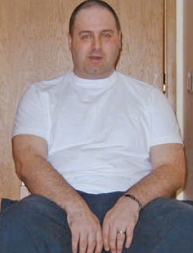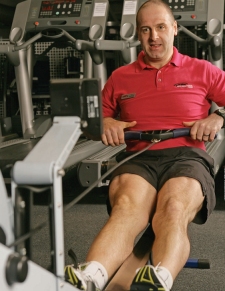Motivational Case Studies
Paul McNeill
Related tags: Physiotherapy
Date Added: Thu, 25 Feb 2010
A stroke that changed my life
In 2004, Paul McNeill, then a police officer weighed nearly 20 stone and had no interest in fitness when he suffered a stroke which left him with brain damage and unable to walk. Today, he's in training for the British Indoor Rowing Championships and now works as a gym instructor.

I joined the Metropolitan Police in 1986. In November 2004 I was sitting in the office at my desk on my own and I did not feel right. After about 10 minutes I made a phone call. The person on the other end realised that something must be wrong as unbeknownst to me I was talking gibberish. I tried to get up and just about made it to the door. Someone else was coming in and they saw me in trouble and called an ambulance. When the ambulance arrived it was quite funny really because they thought I had a viral infection. They asked me to stand and get to the ambulance but when I tried I fell down. That was when I realised that something quite serious was wrong with me. I went to hospital and when I came round the next day I was told that I had had a stroke. In fact the doctor asked me, "So, when was your last stroke? The brain scans had shown previous damage." I was totally dumbfounded, as I never realised that I had strokes previously. Apparently it is possible to have one without knowing and many people do across the course of their lives. This was all happening around the time of my daughters birthday. I thought that I would be home for that. I was getting ready to leave hospital two days later when the next thing I remembered is waking up in the high-dependency unit. I'd had another stroke. And this was the stroke that caused a much bigger amount of damage. I became aware of where I was and the seriousness of the situation about two to three days later. I moved out of this unit when my condition stabilised seven days later.
One of my biggest problems was that my brain had forgotten many neural pathways including how to balance. I began to have physiotherapy and eventually I managed to stand. I then began trying to walk using parallel bars. I was in St Marys Hospital for about another five weeks. When I left I was able to walk five or six steps unaided. When I thought back about what had happened, it was all pretty scary. One day I was perfectly fine and then the next I definitely was not. I had more physiotherapy and moved to a second hospital. I was there for two
So I decided to go for more physiotherapy and rehabilitation as I was entitled to attend the police forces national rehabilitation centre in Reading. I went there for two weeks and began to do other activities designed to get my coordination back. By now I was walking like a tin soldier. The physiotherapist said that one of the best things I could do to keep improving was join a gym. So, I joined the Next Generation close to where I live in Romford. We joined as a family. It was slow progress building up to just being able to do 5 minutes on the cross trainer. And this took a lot of effort. I also began to use the stability ball as a way of re-gaining my balance. And I started to swim and got up to doing 10 lengths. I went and spoke to one of the personal trainers and began to workout under his guidance in the hope my progress would speed up. We worked on my treadmill walking, gradually increasing the speed. I am now up to 6Km/hour but cannot run. I also began to do some basic weight training. Then one day I was asked, Do you fancy trying the rowing machine? I had a go at rowing 1000m. Afterwards I felt absolutely exhausted. But I kept using it as well as training on the other equipment.

By now I was spending two-three hours in the gym and I was really enjoying it. I really got into the rowing. After a while I managed a time of 7min 42 seconds when I went for the 2000m. Then in December 06 I had another go and nearly broke seven minutes. I had a look at the Concept2 rankings for the distance and realised that I wasnt too bad. So I decided that I would enter the British Indoor Rowing Championships this year in November. I also looked at my weight training and started to work with a girl at the gym who is a strength and conditioning specialist.
But I found that with certain exercises such as dead-lifts I would get totally disorientated, so I had to modify what I did. Nevertheless, I found myself getting stronger and stronger and my mobility began to get better and better. I can now walk pretty well, but I still have to stop every now and again to get my bearings. I tend to veer to the right so I walk on the right hand pavements otherwise I could end up walking into the road.
I found out about a charity called RehabUK. They take people who have suffered from brain injury and try to get them back into work. However, I could not go back into the police force so I was retired on medical grounds. Working with RehabUK it was suggested that, as I spend so much time in the gym, that why dont I think about working in that environment? So, I spoke to the manger at my gym and asked, how does someone who is disabled go about getting a job in a gym? He said to me, Get qualified and Ill give you a job here. I took the YMCAs basic gym instructors award and also gained work experience at the gym. I now work part time for Next Generation.
Rehab UK
Paul explains, RehabUK has changed my life. If it wasnt for the input I received through this organisation I would not be where I am today with regards to employment. Although I take the credit for gaining the fitness qualification I was supported every step of the way by Rehab UK, my family and everyone at Next Generation. My aim is to attend the British Indoor Rowing Championships and row 2,000m in a personal best time. At the same time I hope to raise funds for the Rehab UK charity through sponsorship. To support Paul and Rehab UK go to: http://www.row4rehabuk.com
Back to all Case Studies
